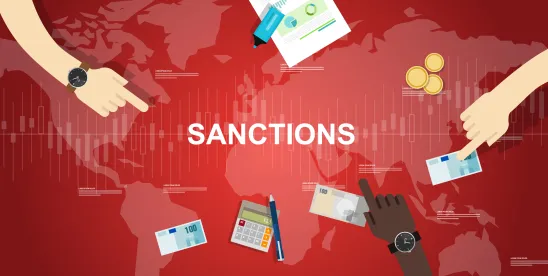On June 12, the U.S. Department of the Treasury and U.S. Department of State imposed additional sanctions on Russia “to intensify the pressure on Russia for its continued cruel and unprovoked war against Ukraine.” The new sanctions target individuals and entities whose products and services “enable Russia to sustain its war effort and evade sanctions.” These new sanctions measures come as President Biden and the Group of Seven prepare to meet in Italy.
Designations
The new sanctions measures target more than 300 individuals and entities, both in Russia and worldwide, involved in numerous sectors, including Russia’s financial system, transnational networks laundering gold for a designated Russian gold producer, production of unmanned aerial vehicles (UAVs), procurement of sensitive and critical items such as materials for Russia’s chemical and biological weapons program, anti-UAV equipment, machine tools, industrial machinery, and microelectronics, and liquified natural gas.
More specifics on sectors the action targets are outlined below:
Sanctions Evasion, Circumvention, and Backfill: The action targets more than a dozen different supply-chain networks used to evade sanctions, “designating more than 90 individuals and entities across Russia, Belarus, the British Virgin Islands, Bulgaria, Kazakhstan, the Kyrgyz Republic, the PRC, Serbia, South Africa, Türkiye, and the United Arab Emirates.”
Russia’s Domestic War Economy: The action targets “more than 100 entities that operate or have operated in the defense and related materiel, manufacturing, technology, transportation, or financial services sectors of the Russian Federation economy.”
Liquefied Natural Gas: The action targets “entities involved in three liquefied natural gas (LNG) projects that Russia hopes to bring online in the future: the Obsky LNG, Arctic LNG 1, and Arctic LNG 3 projects.” The action also included “designations of three entities involved in either construction of natural gas-related projects or manufacturing specialized equipment for LNG transportation, as well as the identification of seven under-construction LNG vessels.”
Software and IT-Related Services Prohibitions
Treasury issued a new determination under Executive Order (E.O.) 14071, which prohibits the supply to any person in the Russian Federation of “(1) IT consultancy and design services; and (2) IT support services and cloud-based services for enterprise management software and design and manufacturing software” (referred to as “Covered Software”). As a result of the determination, the exportation, reexportation, sale, or supply, directly or indirectly, from the United States, or by a United States person, wherever located, of IT consultancy and design services or of IT support services or cloud-based services for Covered Software to any person located in the Russian Federation is prohibited. The determination will take effect Sept. 12, 2024.
FAQ 1188 clarifies that the new software determination does not prohibit U.S. persons from providing services to persons located outside of the Russian Federation that are owned or controlled by persons located inside the Russian Federation provided that the provision of services is not an indirect export to a person located in the Russian Federation. Under this determination, OFAC interprets the “indirect” provision of the prohibited services to include when the benefit of the services is ultimately received by a “person located in the Russian Federation.” FAQ 1185 and FAQ 1186 provide more examples on what activities would be prohibited under the new determination.
General Licenses
As part of the actions, the Office of Foreign Assets Control (OFAC) released six new General Licenses (GL) as part of the action:
GL 6D authorizes “(1) the production, manufacturing, sale, transport, or provision of agricultural commodities, agricultural equipment, medicine, medical devices, replacement parts and components for medical devices, or software updates for medical devices; (2) the prevention, diagnosis, or treatment of COVID-19 (including research or clinical studies relating to COVID-19); or (3) clinical trials and other medical research activities are authorized.” The GL provides for the definition of “agricultural commodities,” “medicine,” and “medical devices.” Notably, the GL does not authorize new investment into Russia or the importation into the United States of certain Russian products, including alcoholic beverages, fish, seafood, and preparations thereof.
GL 8J authorizes transactions with certain listed entities related to energy through 12:01 a.m. ET Nov. 1, 2024. The term “related to energy” means the “extraction, production, refinement, liquefaction, gasification, regasification, conversion, enrichment, fabrication, transport, or purchase of petroleum, including crude oil, lease condensates, unfinished oils, natural gas liquids, petroleum products, natural gas, or other products capable of producing energy, such as coal, wood, or agricultural products used to manufacture biofuels, or uranium in any form, as well as the development, production, generation, transmission, or exchange of power, through any means, including nuclear, thermal, and renewable energy sources.”
GL 25D authorizes transactions related to telecommunications and certain internet-based communications. The GL authorizes “all transactions ordinarily incident and necessary to the receipt or transmission of telecommunications involving the Russian Federation that are prohibited by the Russian Harmful Foreign Activities Sanctions Regulations, 31 CFR part 587 (RuHSR).” Further, “the exportation or reexportation, sale, or supply, directly or indirectly, from the United States or by U.S. persons, wherever located, to the Russian Federation of services incident to the exchange of communications over the internet, such as instant messaging, chat and email, social networking, sharing of photos and movies, web browsing, blogging, social media platforms, collaboration platforms, video conferencing, e-gaming, e-learning platforms, automated translation, web maps, user authentication services, web hosting, and domain name registration services, that is prohibited by the RuHSR, is authorized.” The GL authorizes limited exportation, reexportation, sale, or supply of software, hardware, or technology incident to the exchange of communications over the internet provided certain export control restrictions are met.
GL 98 authorizes the wind down of transactions involving certain listed blocked entities through 12:01 a.m. ET July 27, 2024, provided that any payment to a blocked person is made into a blocked account in accordance with the RuHSR.
GL 99 authorizes the wind down of transactions involving certain listed blocked entities, “as well as certain transactions related to the divestment to non-U.S. persons of debt or equity issued or guaranteed by, or derivative contracts involving, the blocked entities.” The authorizations provided for in GL 99 expire at 12:01 a.m. ET Aug. 12, 2024.
GL 100 “authorizes certain transactions for the divestment to non-blocked, non-U.S. persons of debt or equity, or for the conversion of currencies, involving one or more of the Blocked Entities solely as a securities, trade, or settlement depository, central counterparty or clearing house, or public trading market. GL 100 is intended to cover the divestment of debt or equity of non-blocked companies that may be traded on or through one of the Blocked Entities in their capacity as a securities, trade, or settlement depository, central counterparty or clearing house, or public trading market.” Additionally, “GL 100 would also authorize U.S. persons to transact with one of the Blocked Entities to the extent ordinarily incident and necessary to convert U.S. dollars to another currency, or vice versa.” The authorizations provided for in GL 100 expire at 12:01 a.m. ET Aug. 12, 2024.
FAQs
OFAC also issued eight new Russia-related FAQs, and 10 amended Russia-related FAQs addressing questions arising from the new designations and the general licenses, including interpretations of “foreign financial institution,” “Russia’s military-industrial base,” and “significant transactions,” as well as clarifying authorized transactions under the new IT and software services determinations.
Sanctions Advisory
In addition to the actions, OFAC issued an updated compliance advisory to foreign financial institutions on Russian sanctions risks. The advisory discusses sanctions risks to foreign financial institutions and identification and mitigation steps these entities can take.
Secondary Sanctions Concerns
As part of the designations and new determination, OFAC highlights in a press release new secondary sanctions risks stemming from the action:
On December 22, 2023, President Biden expanded Treasury’s tools to disrupt and degrade Russia’s war machine by authorizing Treasury to impose sanctions on foreign financial institutions for aiding Russia’s military-industrial base. Today, Treasury is broadening the definition of Russia’s military-industrial base to include all persons blocked pursuant to Executive Order (E.O.) 14024. This means that foreign financial institutions risk being sanctioned for conducting or facilitating significant transactions, or providing any service, involving any person blocked pursuant to E.O. 14024, including designated Russian banks such as VTB Bank Public Joint Stock Company (VTB) and Public Joint Stock Company Sberbank of Russia (Sberbank). This expanded definition reflects Treasury’s assessment that Russia has re-oriented its economy and marshalled all parts of its government toward supporting its reprehensible war effort. Foreign financial institutions face sanctions risk for continuing to facilitate transactions involving Russia’s military-industrial base. Financial institutions should review OFAC’s updated sanctions advisory for practical guidance on how to identify sanctions risks and implement corresponding controls.
Key Takeaways
As the Russia/Ukraine conflict continues, the new U.S. sanctions measures represent an effort to further disrupt Russia’s economy and financial infrastructure that the U.S. government sees as enabling Russia’s military-industrial base.
These new measures add to the already complex Russia sanctions landscape, so companies that engages in Russia-related transactions may wish to revisit these dealings to confirm whether they remain permissible. In addition, these designations on non-Russian entities indicate the risks of conducting business in Russia for both U.S. and non-U.S. persons. Thus, companies conducting international business should continue to screen all non-U.S. counterparties and international customers against all applicable U.S. and non-U.S. sanctions lists, regardless of whether they are located in high-risk jurisdictions.







 />i
/>i

